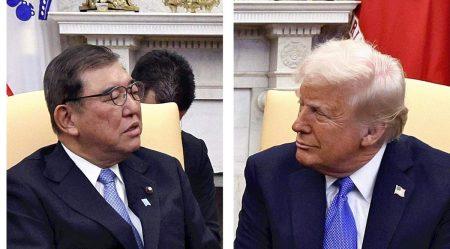Japan Trying to Work Out Which Bargaining Chips Will Resonate with Trump; U.S. Negotiators Discretion Questioned

Prime Minister Shigeru Ishiba, left, and U.S. President Donald Trump at a bilateral meeting in the White House in Washington in February
16:50 JST, April 9, 2025
Prime Minister Shigeru Ishiba, in a phone call with U.S. President Donald Trump on Monday, managed to reach an agreement to enter negotiations toward a review of U.S. tariffs, but many challenges lie ahead.
There are expected to difficulties in ascertaining what bargaining chips the United States will be receptive to, and concerns remain about Washington’s negotiators. If discussions drag on, it could also impact the House of Councillors election this summer.
Ishiba has emphasized that the phone call with Trump was fruitful. “I confirmed with Mr. Trump that [Japan and the United States] will proceed with candid and constructive discussions,” he said at a meeting of a government task force to discuss the response to the U.S. tariffs on Tuesday.
Within the government, there are voices of praise over Japan reaching an agreement with Washington to enter negotiations on the review of the U.S. tariffs, through a top-level phone call, ahead of other countries. “It was a gamble because we couldn’t foresee [the United States’] next move, but [the phone talks] went perfectly,” said a senior Foreign Ministry official.
However, the negotiations will be fraught with difficulties. The government wants to comprehensively present potential bargaining chips that are considered likely to be of interest to Washington, such as investment in the United States by Japanese companies and a review of Japan’s non-tariff barriers. However, a senior government official expressed concern, saying, “To be honest, we can’t predict what will resonate with Mr. Trump.”
There is also a need to dispel the criticisms that differ from reality, such as Trump’s claim of Japan’s “700% tariff on rice.”
“If you calculate it logically, you won’t get a figure like that,” said Agriculture, Forestry and Fisheries Minister Taku Eto. However, a government official said, “During the phone call, Mr. Trump seemed to genuinely believe that Japan has unfair tariff barriers.”
Concerns also exist regarding the authority of U.S. negotiators, including Treasury Secretary Scott Bessent. Within the government, there is a growing view that “there is no one left in the U.S. administration who can speak frankly to the hardline Trump.” A Liberal Democratic Party lawmaker and former cabinet member expressed concern, saying, “We can’t predict how much discretion the negotiators will have.”
Those close to Ishiba said, “We hope that we will obtain a review [of the U.S. tariffs] by the upper house election this summer.” However, if the coordination of interests between Japan and the United States faces hurdles, it could become a headwind for the government and the ruling parties.
Top Articles in Politics
-

Japan PM Takaichi’s Cabinet Resigns en Masse
-

Sanae Takaichi Elected Prime Minister of Japan; Keeps All Cabinet Appointees from Previous Term
-

Japan’s Govt to Submit Road Map for Growth Strategy in March, PM Takaichi to Announce in Upcoming Policy Speech
-

LDP Wins Historic Landslide Victory
-

LDP Wins Landslide Victory, Secures Single-party Majority; Ruling Coalition with JIP Poised to Secure Over 300 seats (UPDATE 1)
JN ACCESS RANKING
-

Japan PM Takaichi’s Cabinet Resigns en Masse
-

Japan Institute to Use Domestic Commercial Optical Lattice Clock to Set Japan Standard Time
-

Israeli Ambassador to Japan Speaks about Japan’s Role in the Reconstruction of Gaza
-

Man Infected with Measles Reportedly Dined at Restaurant in Tokyo Station
-

Videos Plagiarized, Reposted with False Subtitles Claiming ‘Ryukyu Belongs to China’; Anti-China False Information Also Posted in Japan






















